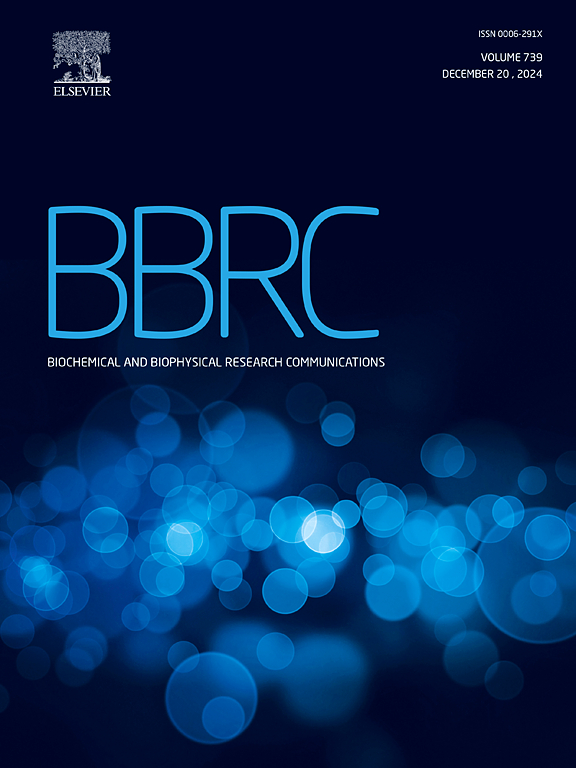BPC1 and BPC2 positively regulates the waterlogging stress tolerance in Arabidopsis thaliana
IF 2.5
3区 生物学
Q3 BIOCHEMISTRY & MOLECULAR BIOLOGY
Biochemical and biophysical research communications
Pub Date : 2025-02-02
DOI:10.1016/j.bbrc.2025.151296
引用次数: 0
Abstract
Waterlogging stress is a significant abiotic factor that severely limits plant growth and development. Identifying genes involved in the waterlogging stress response and understanding the mechanisms by which plants resist waterlogging stress are therefore critical. In this study, we identified a specific role for two transcription factors, BPC1 and BPC2, in the waterlogging stress response of Arabidopsis thaliana. Waterlogging stress markedly upregulated the transcripts of BPC1 and BPC2 in Arabidopsis. Loss-of-function mutations in BPC1 and BPC2 decreased tolerance to waterlogging stress during the seedling growth stage. Physiological analyses demonstrated that the mutations of BPC1 and BPC2 aggravated waterlogging-induced increases in electrolyte leakage, malondialdehyde (MDA) content and hydrogen peroxide (H₂O₂) accumulation by modulating POD activity. Furthermore, quantitative real-time PCR (qRT-PCR) and dual-luciferase assays showed that BPC1 and BPC2 up-regulated the expression of peroxidase gene (Prx28). Collectively, our results indicate that BPC1 and BPC2 positively modulate Prx28 expression to affect the POD activity, modulating electrolyte leakage, MDA content and H₂O₂ accumulation under waterlogging stress. This study reveals the molecular mechanisms underlying waterlogging resistance in A. thaliana, providing new insights into this field.
BPC1和BPC2正向调控拟南芥的耐涝胁迫能力
涝渍胁迫是严重制约植物生长发育的重要非生物因子。因此,鉴定参与涝渍胁迫反应的基因和了解植物抵抗涝渍胁迫的机制是至关重要的。在本研究中,我们确定了两个转录因子BPC1和BPC2在拟南芥涝渍胁迫响应中的特定作用。涝渍胁迫显著上调拟南芥BPC1和BPC2的转录本。BPC1和BPC2的功能缺失突变降低了幼苗生长阶段对涝渍胁迫的耐受性。生理分析表明,BPC1和BPC2突变通过调节POD活性,加剧了涝渍诱导的电解质泄漏、丙二醛(MDA)含量和过氧化氢(h2o2)积累的增加。此外,实时荧光定量PCR (qRT-PCR)和双荧光素酶检测显示,BPC1和BPC2上调过氧化物酶基因(Prx28)的表达。综上所述,我们的研究结果表明,BPC1和BPC2正调控Prx28的表达,从而影响POD活性,调节内涝胁迫下的电解质泄漏、MDA含量和H₂O₂积累。本研究揭示了拟南芥耐涝分子机制,为该领域的研究提供了新的思路。
本文章由计算机程序翻译,如有差异,请以英文原文为准。
求助全文
约1分钟内获得全文
求助全文
来源期刊
CiteScore
6.10
自引率
0.00%
发文量
1400
审稿时长
14 days
期刊介绍:
Biochemical and Biophysical Research Communications is the premier international journal devoted to the very rapid dissemination of timely and significant experimental results in diverse fields of biological research. The development of the "Breakthroughs and Views" section brings the minireview format to the journal, and issues often contain collections of special interest manuscripts. BBRC is published weekly (52 issues/year).Research Areas now include: Biochemistry; biophysics; cell biology; developmental biology; immunology
; molecular biology; neurobiology; plant biology and proteomics

 求助内容:
求助内容: 应助结果提醒方式:
应助结果提醒方式:


